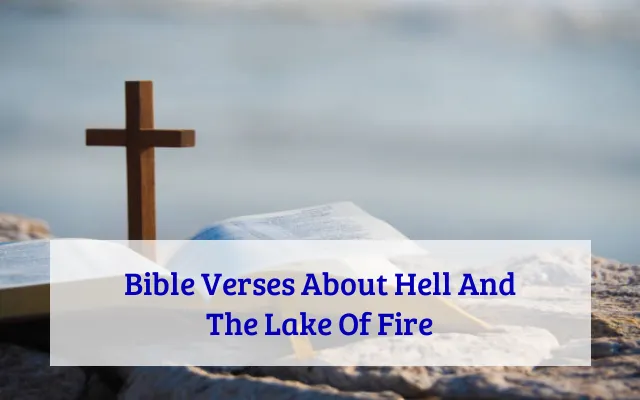Friends, if you’re seeking ‘Bible Verses About Hell And The Lake Of Fire,’ this content is for you. Today, I share Bible verses that will help you better understand hell and the lake of fire according to the Bible. These scriptures provide insight into the biblical concept of eternal punishment and the final destination for those who reject God. Let’s explore what the Word says about these sobering topics, offering a clearer picture of the consequences described in Scripture for those separated from God.
Contents
- 1 What Does the Bible Say About Hell?
- 1.1 Matthew 25:46 – Eternal punishment for the wicked, eternal life for righteous
- 1.2 Revelation 20:14 – Death and Hades cast into the lake of fire
- 1.3 Mark 9:43 – Better to lose a limb than be cast into hell
- 1.4 2 Thessalonians 1:9 – Eternal destruction away from the Lord’s presence
- 1.5 Matthew 13:50 – The wicked cast into fiery furnace, eternal punishment
- 2 The Lake of Fire: Biblical Description and Meaning
- 2.1 Revelation 20:15 – Those not in the book cast into fire
- 2.2 Revelation 21:8 – The lake of fire for the wicked
- 2.3 Matthew 13:42 – Fiery furnace; weeping and gnashing of teeth
- 2.4 Revelation 19:20 – Beast and false prophet cast into lake of fire
- 2.5 Revelation 20:10 – Eternal torment for the devil in the lake
- 3 Key Bible Verses That Describe Hell
- 3.1 Matthew 25:41 – Eternal fire prepared for the devil and his angels
- 3.2 Mark 9:48 – Unquenchable fire and undying worm depict eternal torment
- 3.3 Luke 16:23 – Torment and awareness in Hades
- 3.4 Jude 1:7 – Example of eternal fire punishment
- 3.5 2 Peter 2:4 – Angels cast into darkness awaiting judgment
- 3.6 Revelation 14:11 – Eternal torment, no rest for the wicked
- 4 Is Hell a Real Place According to Scripture?
- 4.1 Luke 16:24 – Rich man in torment seeks relief from Lazarus
- 4.2 Matthew 10:28 – Fear God who can destroy soul in hell
- 4.3 Matthew 23:33 – Judgment for hypocrisy; escape from hell questioned
- 4.4 Revelation 20:13 – The dead judged; sea, death, Hades give them up
- 4.5 Isaiah 66:24 – Undying worms and unquenchable fire for the wicked
- 5 The Difference Between Hell and the Lake of Fire
- 6 Who Goes to Hell According to the Bible?
- 7 How Long Does Hell Last: Eternal Punishment in Scripture
What Does the Bible Say About Hell?
When we talk about hell, it’s often a topic that feels distant and uncomfortable. Yet, the Bible offers insight that can bring clarity. Hell is described as a place of separation from God, a solemn reminder of the choices we make in this life. It’s important to approach this with an open heart, understanding that these teachings guide us toward a life of love and compassion.
Matthew 25:46 – Eternal punishment for the wicked, eternal life for righteous

These shall go away into everlasting punishment: but the righteous into life eternal
Matthew 25:46
Explanation:- This verse highlights the stark contrast between the destinies of the wicked and the righteous. It underscores the concept of eternal punishment for those who reject God’s ways and eternal life for those who follow Him, emphasizing the importance of our choices in this life.
Revelation 20:14 – Death and Hades cast into the lake of fire
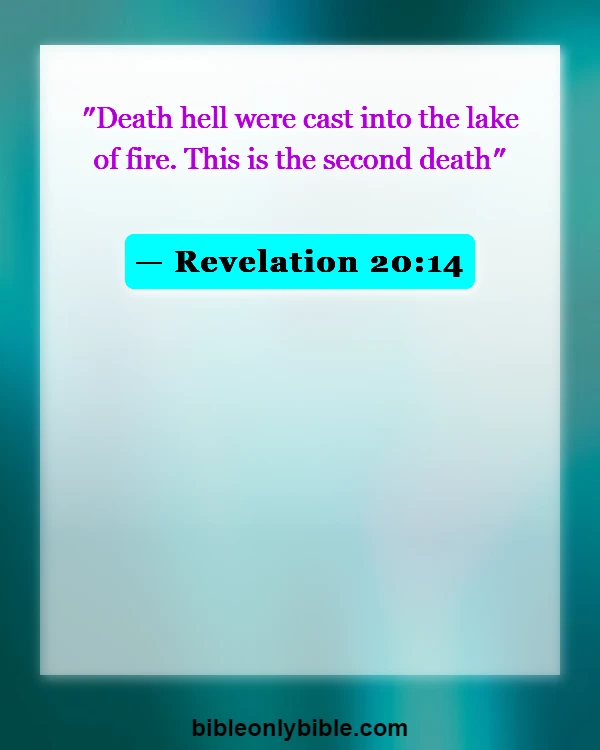
Death hell were cast into the lake of fire. This is the second death
Revelation 20:14
Explanation:- This verse highlights the finality of God’s judgment, where both death and Hades are destroyed by being cast into the lake of fire. It symbolizes the end of death’s power and the ultimate eradication of evil, underscoring the eternal separation from God for those not in the Book of Life.
Mark 9:43 – Better to lose a limb than be cast into hell
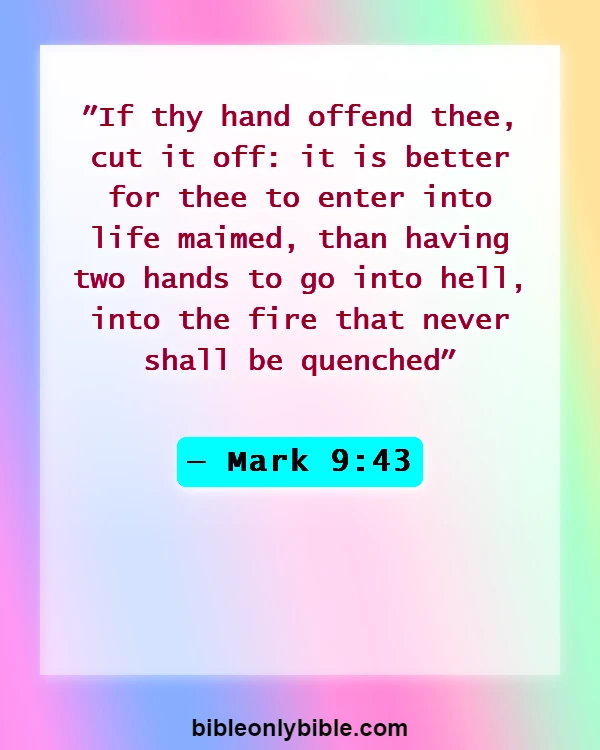
If thy hand offend thee, cut it off: it is better for thee to enter into life maimed, than having two hands to go into hell, into the fire that never shall be quenched
Mark 9:43
Explanation:- This verse highlights the severity and seriousness of hell by illustrating that it is better to make significant sacrifices, like losing a limb, than to risk eternal punishment. It emphasizes the importance of prioritizing spiritual well-being over physical or earthly concerns.
2 Thessalonians 1:9 – Eternal destruction away from the Lord’s presence
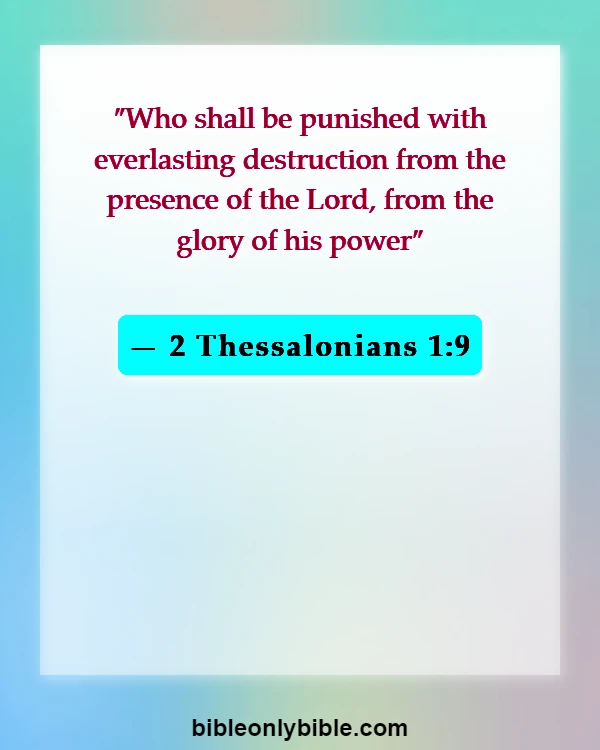
Who shall be punished with everlasting destruction from the presence of the Lord, from the glory of his power
2 Thessalonians 1:9
Explanation:- This verse highlights the severity of eternal separation from God’s presence as a consequence for those who reject Him. It underscores the concept of hell as a place of irreversible destruction and profound loss, emphasizing the importance of faith and obedience to God.
Matthew 13:50 – The wicked cast into fiery furnace, eternal punishment
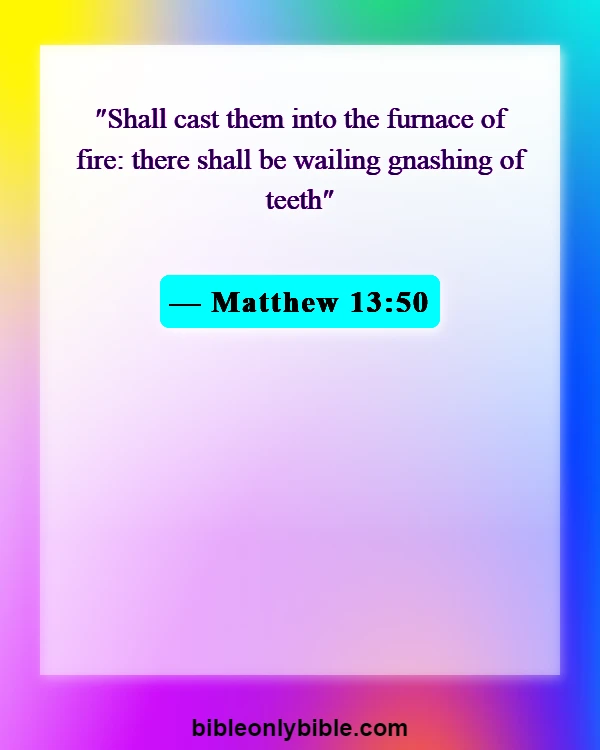
Shall cast them into the furnace of fire: there shall be wailing gnashing of teeth
Matthew 13:50
Explanation:- This verse highlights the fate of the wicked, describing their end as being cast into a fiery furnace, signifying eternal punishment. It underscores the Bible’s depiction of hell as a place of severe judgment and separation from God for those who reject righteousness.
The Lake of Fire: Biblical Description and Meaning
The Lake of Fire is a vivid image found in the Bible, representing the final judgment and ultimate separation from God. It’s a place reserved for those who choose to reject God’s love and grace. Understanding this helps us grasp the gravity of our choices and the significance of living a life aligned with divine principles. Let’s journey together in exploring the deeper truths this imagery holds for us.
Revelation 20:15 – Those not in the book cast into fire
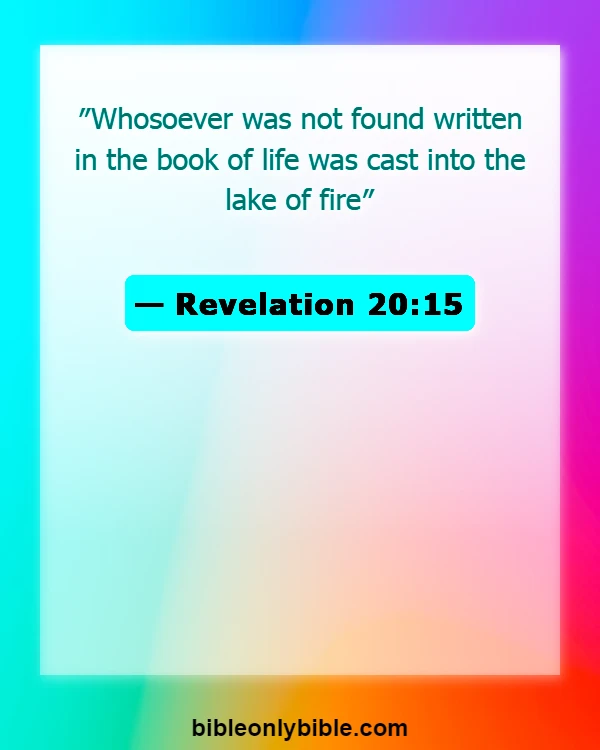
Whosoever was not found written in the book of life was cast into the lake of fire
Revelation 20:15
Explanation:- This verse highlights the final judgment, where those not found in the Book of Life are cast into the lake of fire, symbolizing eternal separation from God. It underscores the importance of faith and being spiritually aligned with God’s will to avoid this fate.
Revelation 21:8 – The lake of fire for the wicked
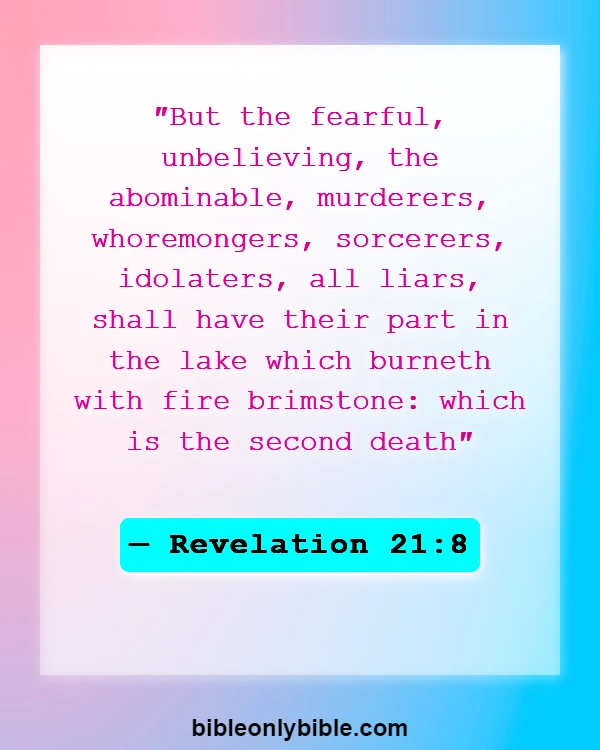
But the fearful, unbelieving, the abominable, murderers, whoremongers, sorcerers, idolaters, all liars, shall have their part in the lake which burneth with fire brimstone: which is the second death
Revelation 21:8
Explanation:- This verse provides a stark warning about the fate of the wicked, highlighting that the “lake of fire” is a place of ultimate judgment and separation from God. It underscores the seriousness of sin and the importance of living righteously.
Matthew 13:42 – Fiery furnace; weeping and gnashing of teeth
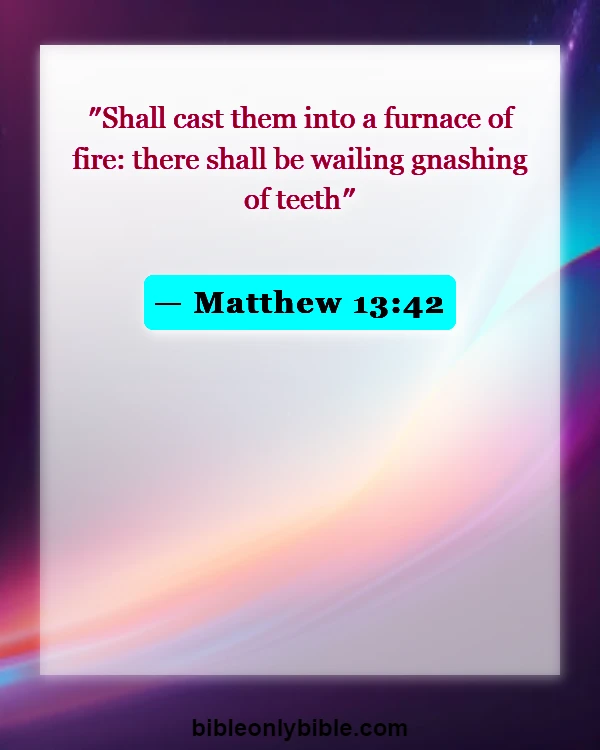
Shall cast them into a furnace of fire: there shall be wailing gnashing of teeth
Matthew 13:42
Explanation:- In this verse, Jesus vividly depicts the fate of the wicked as being cast into a fiery furnace, symbolizing the lake of fire. This imagery conveys intense suffering and despair, illustrated by “weeping and gnashing of teeth,” emphasizing the severe consequences of rejecting God.
Revelation 19:20 – Beast and false prophet cast into lake of fire
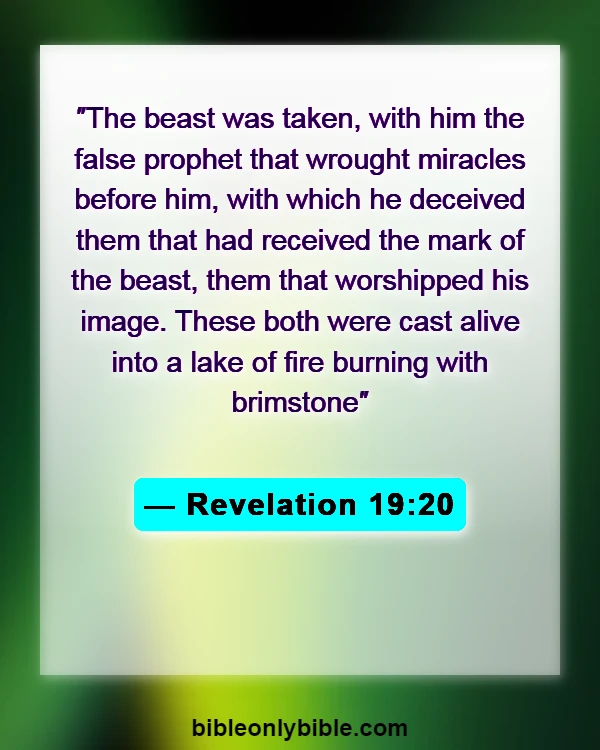
The beast was taken, with him the false prophet that wrought miracles before him, with which he deceived them that had received the mark of the beast, them that worshipped his image. These both were cast alive into a lake of fire burning with brimstone
Revelation 19:20
Explanation:- This verse describes the ultimate judgment where the beast and the false prophet are cast into the lake of fire. It symbolizes the final defeat of evil and God’s triumph over deception and wickedness, illustrating the severe consequences for those who oppose God’s truth.
Revelation 20:10 – Eternal torment for the devil in the lake
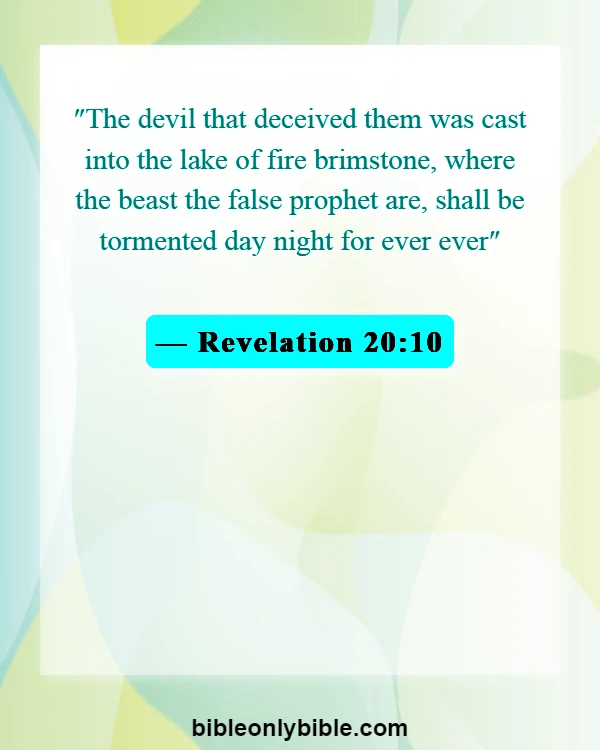
The devil that deceived them was cast into the lake of fire brimstone, where the beast the false prophet are, shall be tormented day night for ever ever
Revelation 20:10
Explanation:- This verse highlights the ultimate fate of the devil, emphasizing eternal torment in the lake of fire. It underscores the finality of divine justice and serves as a warning of the consequences of evil, affirming the triumph of righteousness over darkness.
Key Bible Verses That Describe Hell
Hell is portrayed in scripture with stark imagery, meant to awaken us to the spiritual realities we face. These verses paint a picture of a place to be avoided, urging us toward a path of righteousness and faith. By reflecting on these descriptions, we gain a better understanding of the consequences of our spiritual journey, encouraging us to seek a life full of grace and love.
Matthew 25:41 – Eternal fire prepared for the devil and his angels
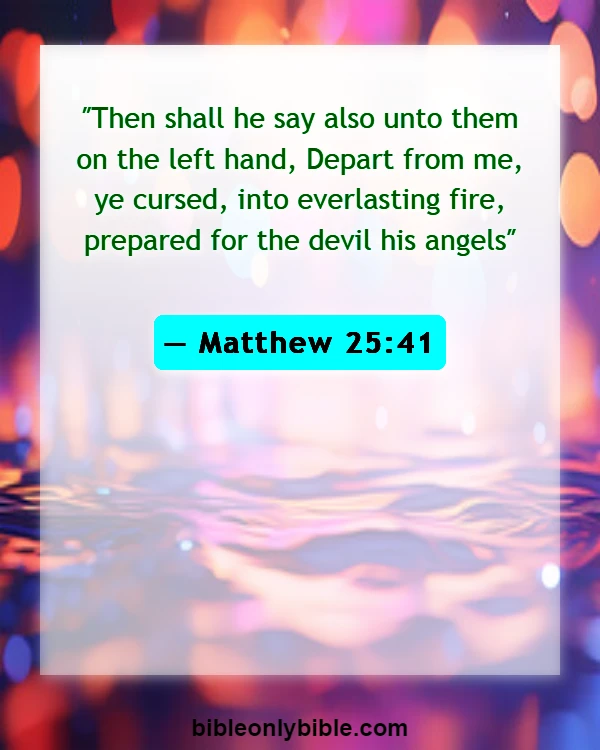
Then shall he say also unto them on the left hand, Depart from me, ye cursed, into everlasting fire, prepared for the devil his angels
Matthew 25:41
Explanation:- This verse highlights the concept of eternal separation from God, where the “eternal fire” is prepared specifically for the devil and his angels. It underscores the seriousness of judgment and the consequences for those who reject God’s ways, emphasizing accountability and divine justice.
Mark 9:48 – Unquenchable fire and undying worm depict eternal torment
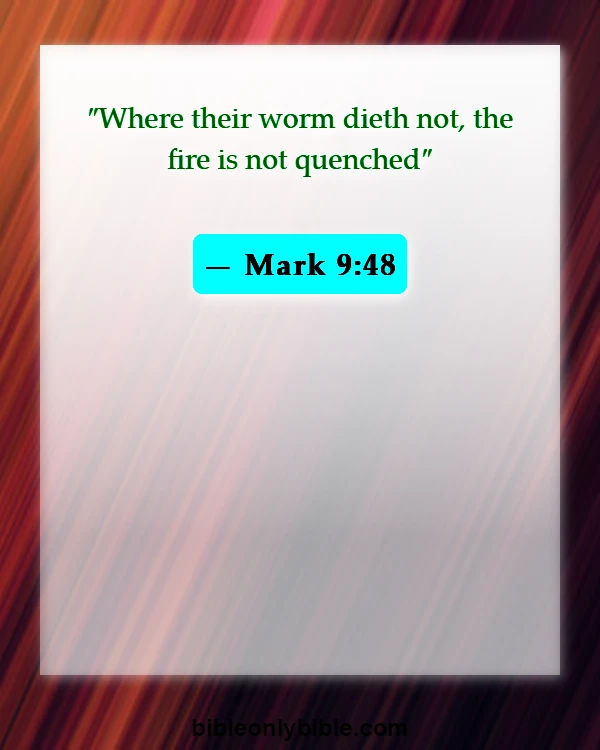
Where their worm dieth not, the fire is not quenched
Mark 9:48
Explanation:- This verse vividly portrays hell as a place of eternal torment, emphasizing its unending nature through the imagery of an unquenchable fire and undying worm. These symbols underscore the severity and permanence of separation from God, urging reflection on spiritual choices.
Luke 16:23 – Torment and awareness in Hades
In hell he lift up his eyes, being in torments, seeth Abraham afar off, Lazarus in his bosom
Luke 16:23
Explanation:- This verse highlights the conscious torment and awareness experienced in Hades, illustrating the reality of suffering after death for the unrighteous. It underscores the seriousness of eternal consequences and serves as a solemn reminder of the separation from God’s presence in the afterlife.
Jude 1:7 – Example of eternal fire punishment
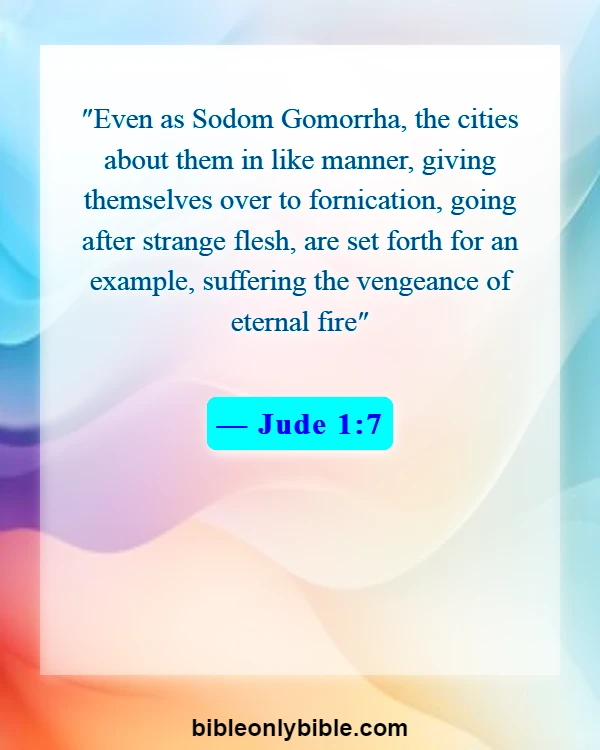
Even as Sodom Gomorrha, the cities about them in like manner, giving themselves over to fornication, going after strange flesh, are set forth for an example, suffering the vengeance of eternal fire
Jude 1:7
Explanation:- Jude 1:7 highlights the destruction of Sodom and Gomorrah as a warning of eternal fire, symbolizing the consequences of immorality and ungodliness. It serves as a vivid example of divine judgment, emphasizing the reality and severity of eternal punishment.
2 Peter 2:4 – Angels cast into darkness awaiting judgment
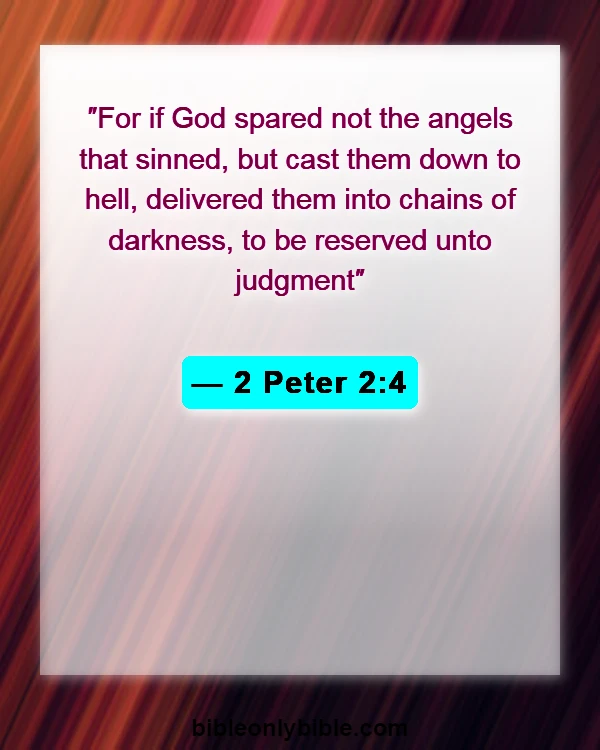
For if God spared not the angels that sinned, but cast them down to hell, delivered them into chains of darkness, to be reserved unto judgment
2 Peter 2:4
Explanation:- This verse highlights the gravity of divine justice, illustrating how even angels who sinned are not spared from God’s judgment. They are cast into darkness, awaiting their final judgment, underscoring the seriousness of sin and the inevitability of divine retribution.
Revelation 14:11 – Eternal torment, no rest for the wicked
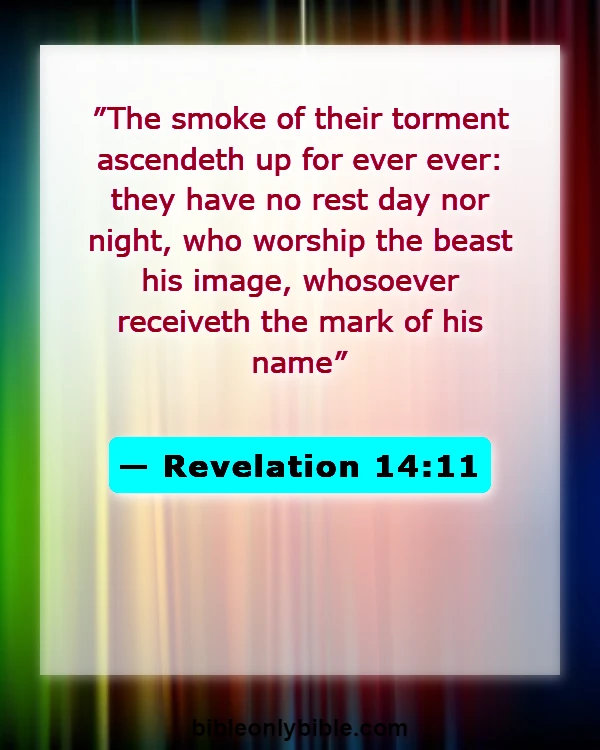
The smoke of their torment ascendeth up for ever ever: they have no rest day nor night, who worship the beast his image, whosoever receiveth the mark of his name
Revelation 14:11
Explanation:- Revelation 14:11 vividly portrays the eternal torment awaiting the wicked, emphasizing the unending nature of their suffering. It highlights the absence of rest or relief for those who reject God, serving as a solemn reminder of the consequences of defying divine authority.
Is Hell a Real Place According to Scripture?
When we ask if hell is real, the Bible provides a clear answer. It describes hell as a tangible reality, a place of consequence for those who turn away from God’s truth. This understanding invites us to live with intention, embracing the hope and redemption offered to us. It’s a call to live each day with purpose, knowing that our choices matter deeply in the grand tapestry of life.
Luke 16:24 – Rich man in torment seeks relief from Lazarus
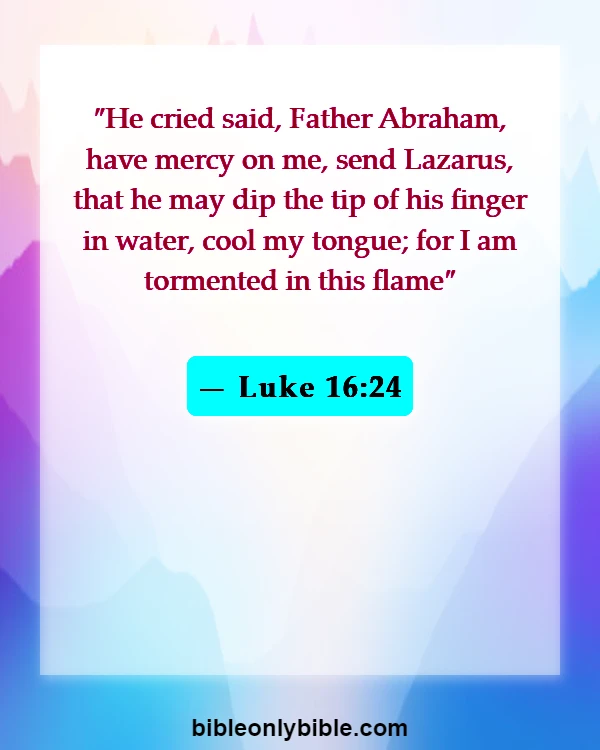
He cried said, Father Abraham, have mercy on me, send Lazarus, that he may dip the tip of his finger in water, cool my tongue; for I am tormented in this flame
Luke 16:24
Explanation:- In this verse, the rich man, suffering in torment, pleads for relief from Lazarus, highlighting the reality and anguish of hell. It underscores the seriousness of eternal separation from God and serves as a stark reminder of the consequences of earthly choices.
Matthew 10:28 – Fear God who can destroy soul in hell

Fear not them which kill the body, but are not able to kill the soul: but rather fear him which is able to destroy both soul body in hell
Matthew 10:28
Explanation:- This verse encourages believers to prioritize reverence for God over fear of earthly harm. It underscores the reality of hell, emphasizing God’s ultimate authority over both body and soul. This serves as a reminder of the eternal consequences of our spiritual choices.
Matthew 23:33 – Judgment for hypocrisy; escape from hell questioned
Ye serpents, ye generation of vipers, how can ye escape the damnation of hell?
Matthew 23:33
Explanation:- In this verse, Jesus confronts religious leaders about their hypocrisy, warning them of impending judgment and the reality of hell. This underscores the seriousness of genuine faith and moral integrity, questioning whether they can escape the consequences of their actions.
Revelation 20:13 – The dead judged; sea, death, Hades give them up
The sea gave up the dead which were in it; death hell delivered up the dead which were in them: they were judged every man according to their works
Revelation 20:13
Explanation:- In this verse, the dead are resurrected for judgment, with the sea, death, and Hades releasing them. This illustrates the comprehensive scope of divine judgment and suggests that no hidden place remains untouched, emphasizing accountability before God and the reality of eternal destinations.
Isaiah 66:24 – Undying worms and unquenchable fire for the wicked
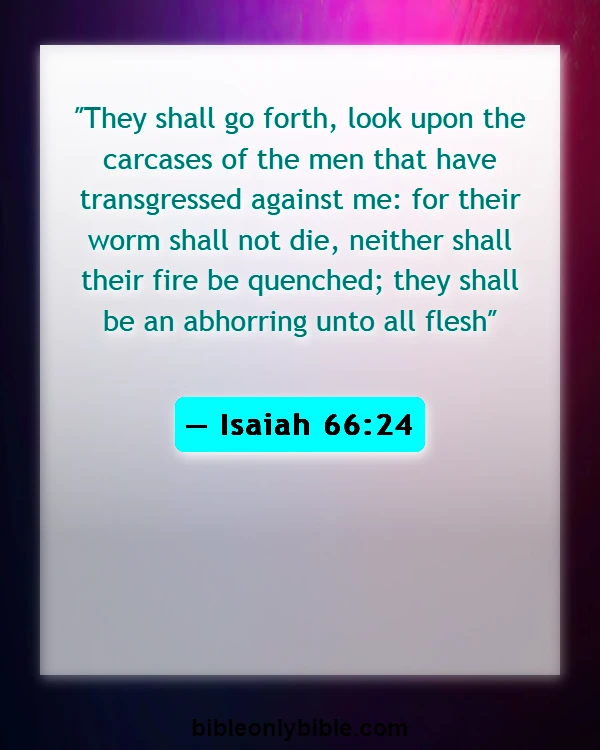
They shall go forth, look upon the carcases of the men that have transgressed against me: for their worm shall not die, neither shall their fire be quenched; they shall be an abhorring unto all flesh
Isaiah 66:24
Explanation:- This verse vividly depicts the fate of the wicked, emphasizing their eternal punishment. It uses imagery of undying worms and unquenchable fire to convey the reality and severity of hell, highlighting the consequences of rejecting God and His ways.
The Difference Between Hell and the Lake of Fire
Understanding the difference between hell and the Lake of Fire can be challenging, but it’s a vital distinction in the Bible. Hell often refers to the current realm of the dead, while the Lake of Fire is the final destination for ultimate judgment. This insight encourages us to reflect on our lives and the enduring significance of our spiritual walk, urging us to seek grace in every moment.
Matthew 18:9 – Remove sin to avoid hell’s eternal punishment
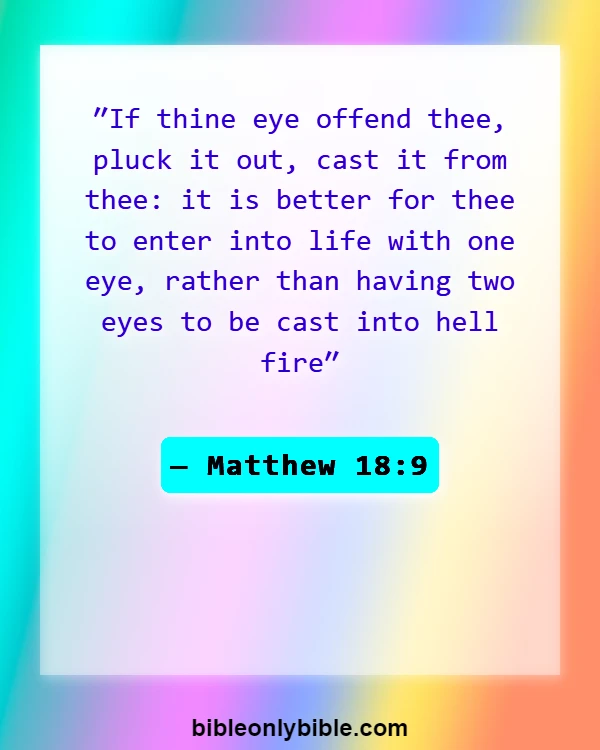
If thine eye offend thee, pluck it out, cast it from thee: it is better for thee to enter into life with one eye, rather than having two eyes to be cast into hell fire
Matthew 18:9
Explanation:- This verse highlights the seriousness of sin and the drastic measures one should take to avoid eternal punishment. It emphasizes the importance of removing sin from our lives to avoid the consequences of hell, underscoring the urgency of repentance and spiritual vigilance.
Luke 12:5 – Fear God who can cast into hell

But I will forewarn you whom ye shall fear: Fear him, which after he hath killed hath power to cast into hell; yea, I say unto you, Fear him
Luke 12:5
Explanation:- This verse highlights the importance of fearing God, who possesses ultimate authority over eternal judgment. It underscores the distinction between earthly fears and the profound reality of divine power, emphasizing the seriousness of spiritual consequences beyond physical death.
Who Goes to Hell According to the Bible?
The Bible speaks clearly about who goes to hell, pointing to those who reject God’s offer of salvation and choose a path away from His love. This isn’t meant to instill fear but to inspire a turning of hearts towards divine guidance. It’s a reminder of the grace available to all and the transformative power of living in accordance with God’s will, fostering a life of joy and purpose.
Matthew 7:13 – The wide path leads to destruction
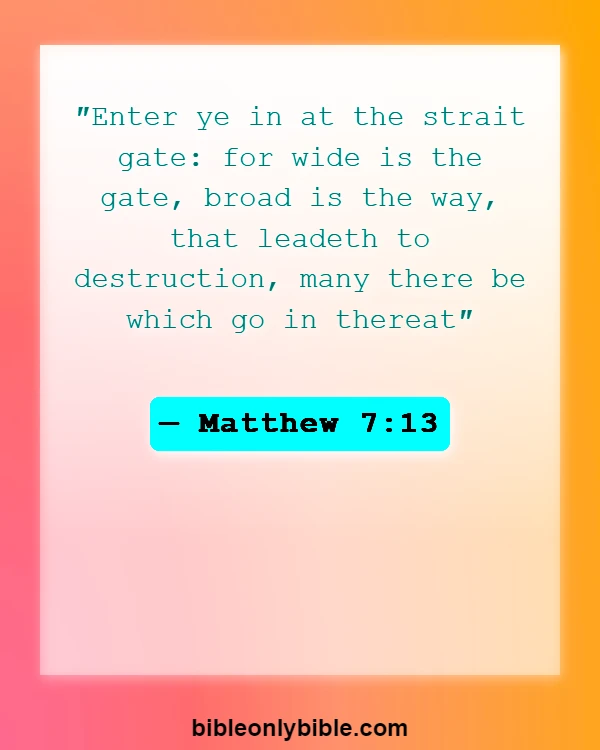
Enter ye in at the strait gate: for wide is the gate, broad is the way, that leadeth to destruction, many there be which go in thereat
Matthew 7:13
Explanation:- This verse warns that many choose the easy, broad path, which ultimately leads to destruction, symbolizing hell. It highlights the importance of making conscious, often difficult, choices to follow a righteous path, emphasizing the eternal consequences of our earthly decisions.
John 3:18 – Belief saves; disbelief condemns already
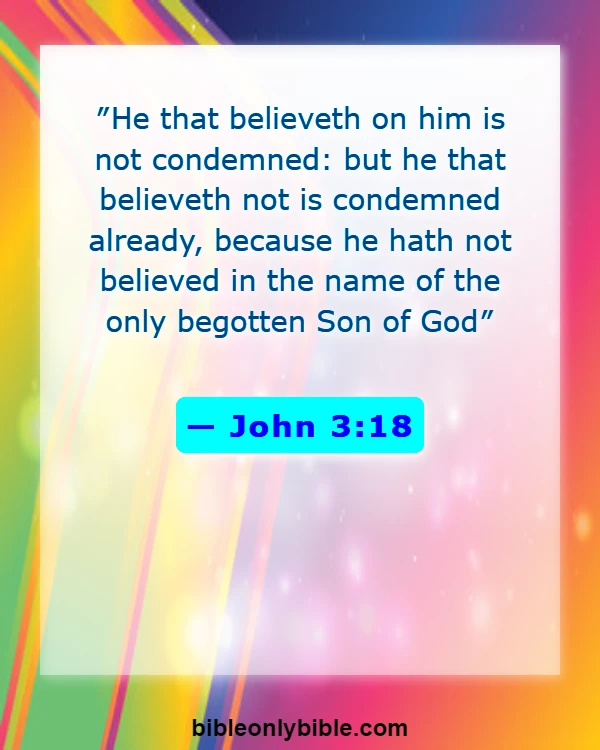
He that believeth on him is not condemned: but he that believeth not is condemned already, because he hath not believed in the name of the only begotten Son of God
John 3:18
Explanation:- This verse highlights the central role of belief in Jesus for salvation. It teaches that while belief in Him leads to salvation, disbelief results in condemnation. It underscores the importance of faith in Jesus to avoid spiritual judgment and separation from God.
Matthew 13:41 – Angels remove evil from God’s kingdom
The Son of man shall send forth his angels, they shall gather out of his kingdom all things that offend, them which do iniquity
Matthew 13:41
Explanation:- In this verse, Jesus describes how angels will gather those who commit sin and cause evil, removing them from God’s kingdom. It highlights the divine judgment where the wicked are separated and cast out, underscoring the reality of hell for evildoers.
How Long Does Hell Last: Eternal Punishment in Scripture
The concept of eternal punishment in hell is a sobering one, highlighted in scripture to underscore the importance of our spiritual decisions. It serves as a wake-up call to live our lives in alignment with God’s love and teachings. This eternal perspective invites us to embrace the present with hope, compassion, and a commitment to making choices that lead us closer to divine truth and eternal joy.
